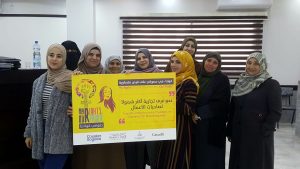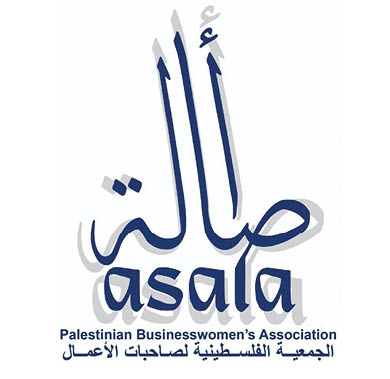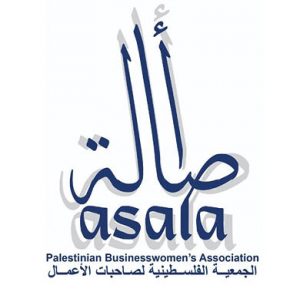Palestinian women entrepreneurs do not benefit as men do from the market economy and economic opportunities. The lack of economic opportunities for women remains a key challenge to achieving women’s social and economic empowerment. According to a report produced by the Palestinian Central Bureau of Statistics in 2018, “The gap in the labor-force participation rate among males and females remains very large where it reached 70.3% for males compared with 19.9% for females.” Therefore, more women are now pursuing the path of entrepreneurship and establishing their own enterprises; women own close to 65,000 micro, small, and medium enterprises (MSMEs) – approximately a quarter of all enterprises in the West Bank and Gaza.*1 Women entrepreneurs, however, still suffer from a scarcity of networks supporting them in economic activities and from society’s traditional attitude towards women’s stereotypical role (as a primary caregiver). They also face numerous difficulties in such areas as obtaining funding, tax reduction, marketing, and accessing markets and information.
According to a report published by the International Journal of Economics, Commerce, and Management in 2015, “Approximately 5.4 percent of registered businesses are women-owned, and of those, 24 percent operate in the services sector.”*2 Significantly, large numbers of women engage in commercial activities; however, their capitalization typically falls far below the amount required to register. As a result, they have limited access to the finance, market information, and business opportunities available to registered businesses, thus restricting their growth potential.
Why are there so few women in Palestinian Chambers of Commerce, Industry, and Agriculture?

In addition, a large number of women entrepreneurs operate from their homes and are not legally registered, leaving them with no legal protection and limiting their businesses’ ability to grow. For example, this status does not allow them to access finance, legal protection, or market and export opportunities. The vast majority of these businesses are “informal,” and therefore unable to access credit through banks. Unregistered enterprises must rely on micro-credit loans, which have low capital requirements but high interest rates, neither of which is conducive to rational business growth.
In addition, women do not register their businesses because they fear that tax regulations would be too great a burden. Tax regulations on micro-businesses do not allow them to be competitive and deter many women business owners from registering since they would have a tax burden that is very close to that of small and medium enterprises. It’s worth mentioning that Palestinian women run and own the vast majority of small and medium-sized enterprises in the informal sector. According to a 2016 study published by Al-Marsad, 60 percent of women SMEs operate in the informal sector.*3
Membership in the Chambers of Commerce, Industry, and Agriculture is mandatory for all registered enterprises. However, during the current chambers elections, female candidates have been virtually absent in West Bank provincial elections for chamber boards. Very few hold positions as business managers, directors, or chairwomen.

The chambers represent 65,000 registered enterprises, and there are 13 chambers in the West Bank, each with a board of 9 to 13 members. Only 3,650 women-led enterprises are registered in the Palestinian Chambers of Commerce. Furthermore, the total membership of the General Assembly in the chambers is 81,054, with only 3,166 female members. Of the 198 members in the chambers’ boards of directors, only 2 are women.
In late 2018 and early 2019, the chambers elections were held – 8 years after the previous elections in 2011. Eligible women voters in the 2018 elections comprised 5 percent of the total number of eligible voters, and only 3 percent of those eligible to run for elections were women. The participation of women in the chambers’ boards was less than 2 percent.
These alarming numbers and statistics reveal the urgent need for immediate intervention to change the current situation for women in the chambers. To this end, The Palestinian Businesswomen’s Association−Asala has begun not only to raise awareness among women, community members, and other stakeholders about the low representation of women in the chambers’ membership and leadership positions but also to promote women’s active participation in the chambers’ elections to ensure that women have a voice and are well represented in the chambers. In cooperation with CowaterSogema and through the project “Generating Revenue Opportunities for Women and Youth in the West Bank” (GROW), funded by the Government of Canada, Asala has implemented a media and advocacy campaign to shed the light on the key barriers that constrain women’s active participation in the chambers, including the nonrefundable nomination fees (1,000 JD), the eligibility requirements for nomination (paying the registration fees for at least three consecutive years to be eligible for nomination to the chamber board elections) and the short period for nomination (one week). For instance, Ms. Majida Salsa’ (who was the first female member of the board of directors in Bethlehem Chamber of Commerce) is one among too many women who were unable to run for elections due to the constraints of the laws and regulations of the chambers. She explains, “The chambers’ law of 2013 stipulates that the candidate must be registered and active in the chamber for at least three consecutive years before his/her nomination to the board election. For some reason, I did not pay the registration fees for 2015, but in 2016 I paid the registration fees for both 2015 and 2016. For this reason only, I could not run in the elections and represent the voice of women in the chambers.”
Increasing women’s participation and representation in representative bodies such as the chambers of commerce will not only guarantee increased participation and growth of women-led businesses but could also ensure genuine economic progress since women run and own the vast majority of small and medium-sized enterprises.
Although more needs to be done to improve the enabling environment and lay the groundwork for women to be more equally represented and as actively engaged in the social, economic, and political spheres as their male counterparts, this campaign has contributed to laying the first stepping stone towards reducing the barriers to the greater representation and engagement of women in the Chamber of Commerce, one of the oldest and largest private-sector representative bodies in the Palestinian territories.
*1 Second Country Gender Action Plan for WB&G (CGAP II), February 2018; IFC Annual Report 2016, Experience Matters; IFC Press Release, April 6, 2016.
*2 Althalathini, D., Women Entrepreneurs in Gaza Strip: Obstacles and Opportunities, International Journal of Economics, Commerce and Management, 2015, p. 16.
*3 Press release, “The informal labor sector in Palestine supports and strengthens the steadfastness of citizens” (in Arabic), Maan News Agency, November 5, 2016, available at http://www.maannews.net/Content.aspx?id=874834.





